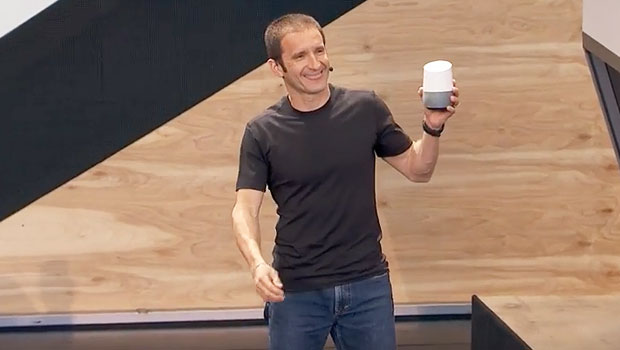Google CEO Sundar Pichai kicked off the company’s annual I/O developers conference on Wednesday with a keynote address that included previews of a batch of new products. Among those showcased were Google Assistant, a tool that can understand and respond to complex questions in real time; and Home, Google’s highly anticipated response to Amazon’s Echo speaker.
Google VP of Product Management Mario Queiroz, pictured above, took the stage to demonstrate some of Home’s capabilities.
“What makes Google Home really shine is that it has Search built in,” he said.
Google officials took a big step toward answering one of the chief complaints of the company’s critics — that for all of the years it has dominated the Web with search technology, it has fallen behind in translating that success into tangible hardware and services. Rivals including Amazon and Facebook already have launched several products integrating new machine learning and conversational speech technologies into the connected home ecosystem, threatening to leave Google in the dust.
“Progress in all of these areas is accelerating, thanks to profound advances in machine learning and AI, and I believe we are at a seminal moment,” Pichai told I/O attendees.
Google has “evolved significantly over the past 10 years, and I believe we are poised to take a big leap forward over the next 10 years,” he added.
Household Help
Google Assistant can do everything from buying movie tickets, to making a reservation for a family dinner and navigating to any given destination, according to Pichai.
Google considers its language translation technology the most advanced in the world. A user can simply point a mobile phone at a menu and receive a translation in real time, for example.
Google Home will be able to use some of the same technologies that power Assistant to turn on lights, play music, set an oven timer, or check a flight reservation.
“Home represents Google’s reimagining of the platform with three key apps, music and entertainment, the newly announced Google Assistant and the incorporation of Google search,” said Mark Hung, research vice president of IoT and wireless at Gartner.
Pichai credited the Amazon Echo’s incorporation of Alexa voice recognition technology with artificial intelligence and machine learning for starting a new home tech category, Hung noted.
However, Google’s iteration can profit from some of its own built-in advantages, including dominant search technology and superior voice recognition and machine learning capabilities, he told TechNewsWorld.
Google Home will be released later this year.
Smart Home Competition
“Google Home is the stake in the ground in Google bringing a smart assistant into the home — and in the bigger picture, a connected life within the future smart home that is built around their interfaces,” said Paul Erickson, senior analyst at IHS Technology.
“A connected speaker is only one manifestation of that — a Google voice interface could just as easily be part of mic-equipped smart appliances, smoke detectors, thermostats, and AV devices from different brands,” he told TechNewsWorld.
“Amazon has done very well in seizing the narrative after CES from Apple and Google’s smart home efforts, in their striking of many partnerships and in a variety of expected and unexpected use cases and integrations arising for Alexa due to their agnostic stance and platform,” Erickson pointed out.
“This will continue to be an asset going forward, but the Google Home announcement suggests that Google is casting a wide net as well,” he said.
Google ultimately will be able to scale larger and broader with Home than Amazon can with Alexa, Erickson predicted.
Amazon won’t be standing still while Google builds out its home ecosystem, however.
“Google’s voice control does offer more contextual responses and seems to have better AI than Amazon’s Alexa — but Amazon has time to improve its product as well,” Tirias Research Principal Analyst Kevin Krewell told TechNewsWorld.
Tech Parade
Google also introduced new messaging technologies at I/O, called “Allo” and “Duo,” which are set for launch this summer.
Allo, which works with Google Assistant, has a feature called “Smart Reply,” which answers questions in their proper context, uses emojis and stickers, and offers an incognito mode that provides end-to-end encryption, message expiration and discreet notifications.
Duo is a companion app for one-on-one video calling.
Google also previewed its new Android N operating system. It includes a new JIT compiler for faster app installation and improved software performance, and Vulcan — a 3D rendering API for high performance graphics on mobile. The Android N developer preview 3 beta program is available for Nexus 6, 6P, 5X and Android One smartphones, Nexus 9 and Pixel C tablets, and Nexus Player.
Apparently having stumped the marketing whiz kids, Google is putting out a call to consumers to come up with a nifty name for Android N.
Google devoted a few moments during the I/O keynote to Daydream, a platform for high-quality mobile VR. Google is working with a number of manufacturers to make Daydream available on phones. It also is sharing designs for a VR viewer and controller.

Finally, the company announced a major expansion of Firebase, its developer platform. Firebase is expanding to become a unified platform for Android, iOS and mobile Web development. A new offering dubbed “Firebase Analytics” provides information about what users are doing with developer apps, as well as information on how paid ad campaigns are performing.






















































